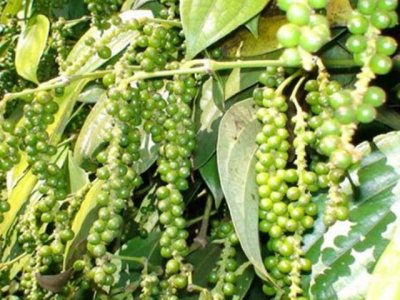Vietnamese farmers banking on pepper despite signs of oversupply

Vietnamese farmers sell pepper for VND54,000-58,000 per kilogram, half the price in 2017. Photo by VnExpress
Pepper prices have been falling rapidly but farmers continue to expand production as the spice is proving more profitable than other crops.
Following in the success of farmers in Vietnam's southern province of Binh Phuoc, Nguyen Van Tan has decided to cut down his two hectares of rubber and coffee trees to set aside land for a pepper plantation of 4,500 trees.
“Many people arrived here empty-handed, but the money they make from pepper has helped them to build houses and even buy cars,” he said. “I hope pepper can improve my life as well.”
Vietnam’s pepper farmers prospered thanks to high export prices sparked by increasing global demand some years ago. According to the agriculture ministry, pepper fetched around VND200,000 ($8.90) a kilogram in 2015, which was more than 4-5 times of the production cost.
Like Tan, many other farmers have raced to jump on the pepper bandwagon, with smallholdings of 1-2 hectares.
The country’s pepper plantations jumped to more than 152,000 hectares in 2017 from just 51,500 hectares in 2010, said Le Van Duc, vice head of the Plantation Department under the Ministry of Agriculture and Rural Development.
In 2017, Vietnam, the world’s biggest pepper exporter, produced 200,000 tons of the spice. The country provides some 60 percent of global pepper output.
According to local experts, Vietnam’s production capacity has increased from year to year because of area expansion, which has resulted from rising prices and increasing demand. This lasted long enough to give Vietnamese farmers the confidence to invest in pepper cultivation.
Vietnam's expanding pepper plantations have significantly contributed to the growth of the trees worldwide, according to the department.
Combined global pepper plantations rose to nearly 519,000 hectares in 2015 from 443,000 hectares in 2010, which has resulted in an oversupply.
Between 2012 and 2017, the world’s pepper production surged by 5.5 percent, but demand rose only 2.4 percent.
The increased global supply has resulted in declining prices, and Vietnamese farmers are paying the price for their overproduction.
In Vietnam, farmers can now net VND54,000-58,000 per kilogram, equal to just half of that in 2017, and a quarter from 2016.
If the plantations continue to expand at their current rate, pepper prices will continue to plummet as supply far exceeds demand, according to experts.
Despite these warnings, farmers are continuing to expand their pepper plantations.
“Price fluctuations are quite common. After falling, the price of pepper will rebound,” Tan said. “Despite the lower prices, pepper is still more profitable than other crops. I want to set aside more land to expand production.”
A hectare of pepper can earn farmers at least VND240 million from each harvest, while the same area of coffee will make them only VND100-150 million, according to the Vietnam Pepper Association.
Export challenges
Vietnam shipped abroad 30,000 tons of the commodity worth $117 million in the first two months of this year, up 36.9 percent in volume, but down 23 percent in value over the same period last year, according to the General Statistics Office.
Vietnam’s pepper industry also faces food hygiene and safety concerns in foreign markets.
For example, in order to export 40,000 tons of pepper to the European Union, Vietnamese firms need to import 22,000 tons of clean pepper from Cambodia, Malaysia or Indonesia to process and export.
Similarly, in order to ship the product to Japan, local companies must import raw pepper to process first.
This is because in the past, Vietnamese pepper has been found to contain excessive chemical residue.
Vietnamese farmers often use excessive amounts of fertilizer and pesticide to boost productivity, weakening the natural resistance of pepper trees. As the trees grow more vulnerable to pests, farmers apply higher doses of chemicals, according to the association.
To address the issue, Vietnamese and foreign firms are working with farmers to clean up the plantations.
According to experts, organic pepper is slowly catching on, which may mean lower productivity, but should ensure higher prices in a more stable market.
Có thể bạn quan tâm
 Hanoi to implement measures for agricultural development
Hanoi to implement measures for agricultural development Hanoi has recently organized a conference to review the task in the first quarter of 2018 and deploy key missions in the last months of the year.
 US workshop boosts Vietnamese agricultural export
US workshop boosts Vietnamese agricultural export Total rice exports for the year reached 5.89 million tonnes, earning 2.66 billion USD, a year-on-year surge of 22.4 percent in volume and 23.2 percent in value.
 The livestock sector is heavily influenced by CPTPP
The livestock sector is heavily influenced by CPTPP While a large number of exporters are motivated to boost exports, the livestock sector will face difficulty, even fight in the "domestic market".